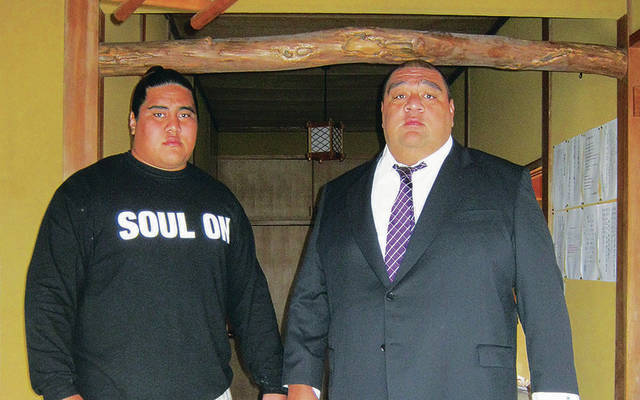TOKYO >> In most other sports, being the nephew of the coach could lead to whispers if not outright charges of nepotism.
But in the time-honored meritocracy that is Japan’s centuries-old national sport of sumo, you rise — or fall — on individual performance in the ring.
Win a majority of your matches and promotion is automatic. Lose more than you win and demotion is dictated, no matter the family name, prestige or wealth.
In the Musashigawa stable, where wooden tiles featuring the ring name of each sumotori are arranged by rank above the practice ring, the one representing Musashikuni — Mamo Ailua Penitani of Waianae — is listed first.
Among the 16 aspiring wrestlers in the stable operated by his uncle, Fiamalu Pentani, the former Musashimaru, his place in the sport’s third highest division, makushita, puts the 22-year-old at the top.
A former Waianae High football player who now weighs nearly 370 pounds, Musashikuni is the lone active sumotori from Hawaii in a sport that once counted them in double digits.
In recognition of his ranking in the ring, he is among the first in the stable to shower and be allowed to sit down for the post-practice meal of chanko nabe.
He is also responsible for encouraging and offering direction to the lower-ranked sumotori, who ritually bow in recognition.
“Maybe at first they wondered how my uncle would treat me, but I think they know I don’t get any special favors, just what I earn from the ring,” Musashikuni said. “In fact, he demands more from me.”
But while Musashikuni is top man in the stable, his focus is on going to the first of the salaried divisions in Japan’s national sport.
Sumotori below the top two divisions, makuuchi and juryo, receive stipends, room, board and expenses. But salaries and bonuses, along with additional privileges, come with the accession, where they compete in 15 matches per tournament instead of seven.
Most sumotori — and there are 600-700 at a time in the sport — never make it beyond the 120-member makushita, where true to the Chinese characters that mean “below the curtain,” the crunch comes.
Musashikuni, who has competed in the division since July reaching as high as No. 26, says his goal is to “hopefully make juryo by the end of the year. But I have a lot of work to do.”
“My uncle is pushing me and Konishiki, who sometimes comes over at practice, is also working with me.”
Maui’s Jesse “Takamiyama” Kuhaulua the first foreigner to win a sumo tournament, says, “He’s young yet. Akebono, Konishiki and Musashimaru were special, really special, they were elite guys who moved up quickly. So you’ve got to give him (Musashikuni) some time.”

